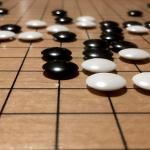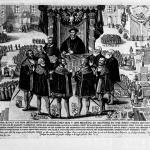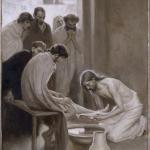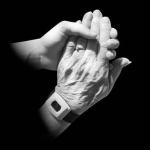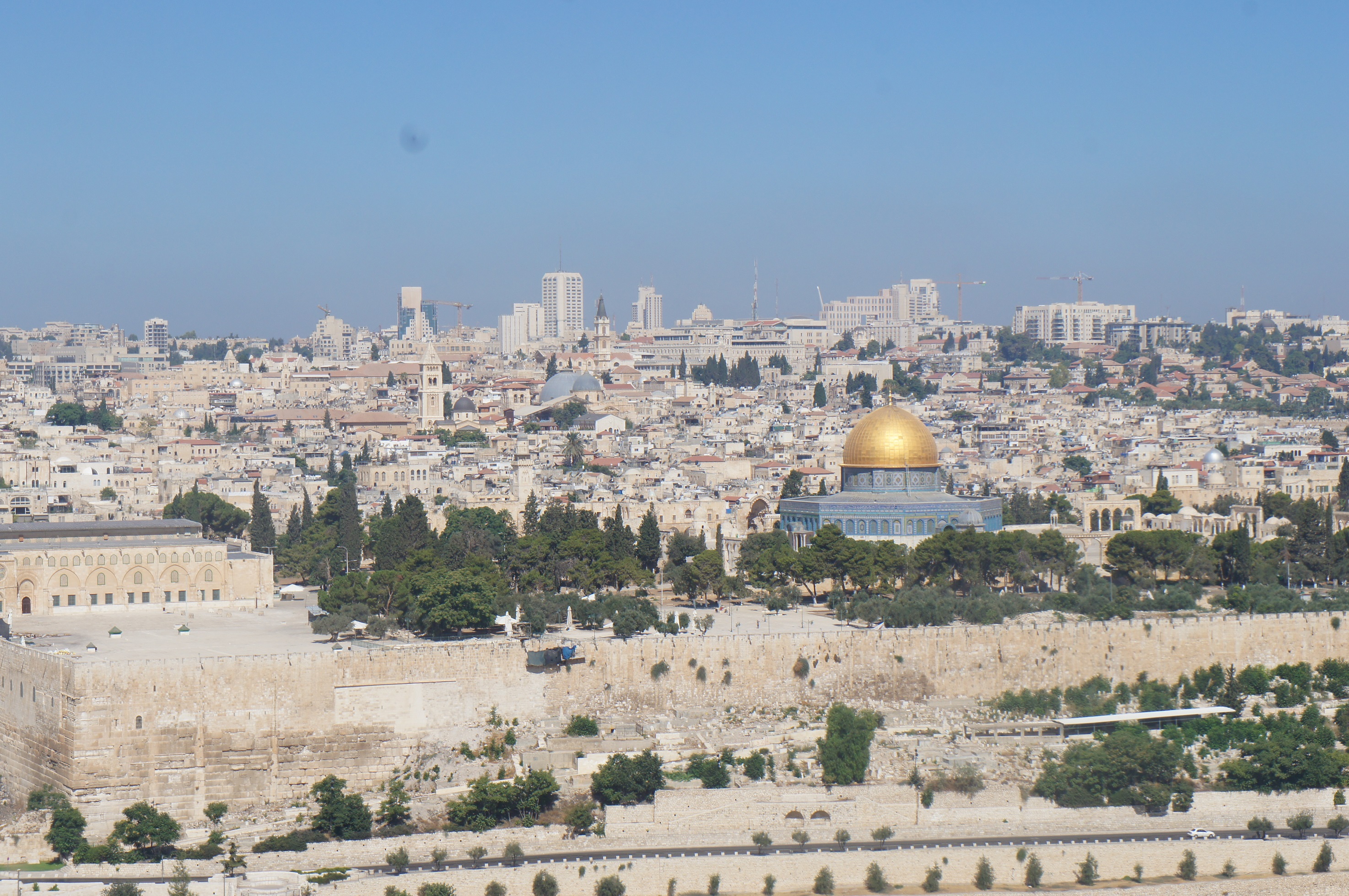
It was August 1, 2016. Groggy from a red-eye flight, I found myself moving in a trance-like state, barely able to make sense of what was happening around me. Just three days earlier I had been in Poland, surrounded by thousands of young Catholics from around the world, praying the Stations of the Cross with Pope Francis. Now, jet-lagged and exhausted, I was walking among the real Stations of the Cross, the original Via Dolorosa.
I could barely believe my eyes as I entered the Church of the Holy Sepulchre – believed to be the site of Jesus´ death and resurrection. Trying not to stumble as I walked the sloping streets of the Old City, I was overwhelmed by sensations – the smells of incense, the sounds of the Muslim Call to Prayer, the sight of so many vendors selling everything from dresses to candy to US football memorabilia written in Hebrew. I was surprised by the whiteness of the buildings – I had not known that Jerusalem was a city in white – and also by the hilly landscape. Despite the frequent mention of mountains in the Bible, for some reason I had pictured the land as flat.
My visit to Jerusalem was brief but packed. During the week I visited the Mount of Olives and the Garden of Gethsemane. I saw the Israel Museum and Yad Vashem, the world Holocaust commemoration center. All in all, Jerusalem was the most exotic place I had ever seen. I had never been to a city this ancient; the weight of history was everywhere. I felt exposed and underdressed, noticing that I was the only woman in the street wearing a sleeveless shirt. I felt intimidated by my lack of knowledge of either Hebrew or Arabic.
Meanwhile, I was disturbed by subtle and not-so-subtle signs of conflict. Early on, I was informed that the white buses were for Arabs; the green buses were Israeli. I was staying with a friend in an Arab neighborhood where Israeli taxis refused to drive. Each morning a group of men congregated on the curb – Arab day laborers waiting for anyone to offer them work.
Walking through the city center, I tried to make sense of the people I encountered. Unless they were dressed in obviously religious garb, I could not discern anyone´s ethnicity or religion; I had no idea of whether to thank them by saying ¨Toda¨ (the Hebrew word for ¨Thank you¨ or ¨Shukran¨ (the Arabic one). I spent the week in a whirlwind of confusion, knowing that I would need to stay much, much longer to even begin to make sense of everything I was taking in.
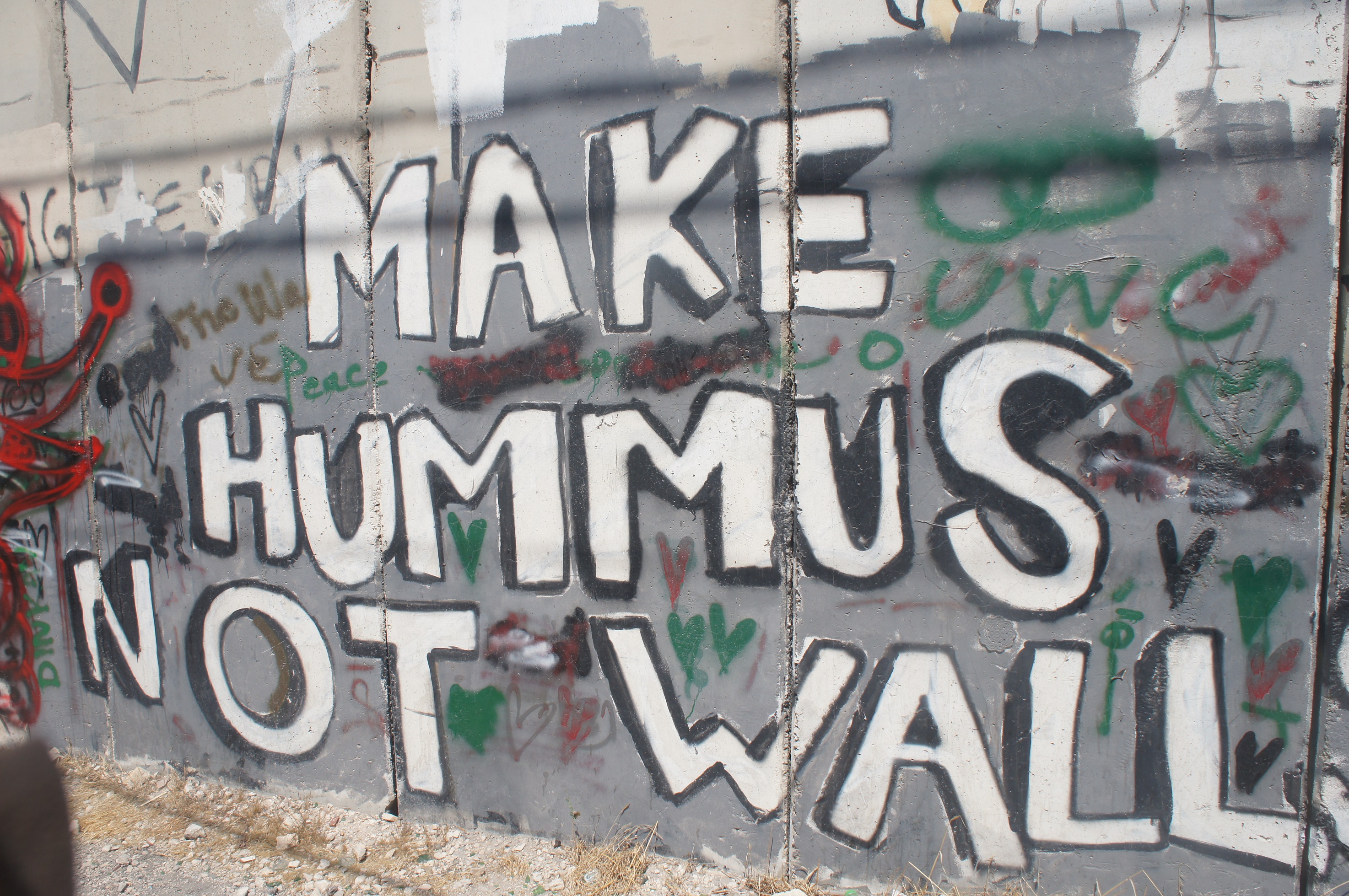
However, despite this overwhelming sense of disorientation, I also found moments of connection. I was not in Israel on my own – I was staying with my friend Sara, an Emory University Ph.D. student researching US Christian tourists in the Holy Land. At Yad Vashem I was able to visit Elie, an Israeli friend I´d made in Poland. However, one of the most impactful encounters I had was the chance to cross the checkpoint to the other side of the wall, to go to Christ´s birthplace and meet Usama Nicola, a Palestinian Catholic who works with the Wi´am Palestinian Conflict Transformation Center and operates alternative tours. Nearly every day Nicola takes foreign tourists to sites of interest behind the wall, like the Church of the Nativity in Bethlehem, the only remaining keffiyah factory in Palestine, the mosque and synogogue that are separated by bullet-proof glass at the Tomb of Abraham in Hebron. We also walked through one of the 121 Israeli settlements in the West Bank – illegal according to the UN, but supported by military force. Later, Nicola introduced me to a Palestinian farmer outside Bethlehem who´d had his family´s home torn down four times by the Israeli army, as they are trying to confiscate the land for another settlement.
Three months after this experience, I am still struggling to make sense of all that I saw and learned during that short visit, and I plan to write several posts and essays about my experience. Not long ago I decided to spoke to Usama Nicola again in an effort to dig a little deeper into the work he does and the goals he hopes to achieve. Today I am happy to share some highlights from this conversation with you.
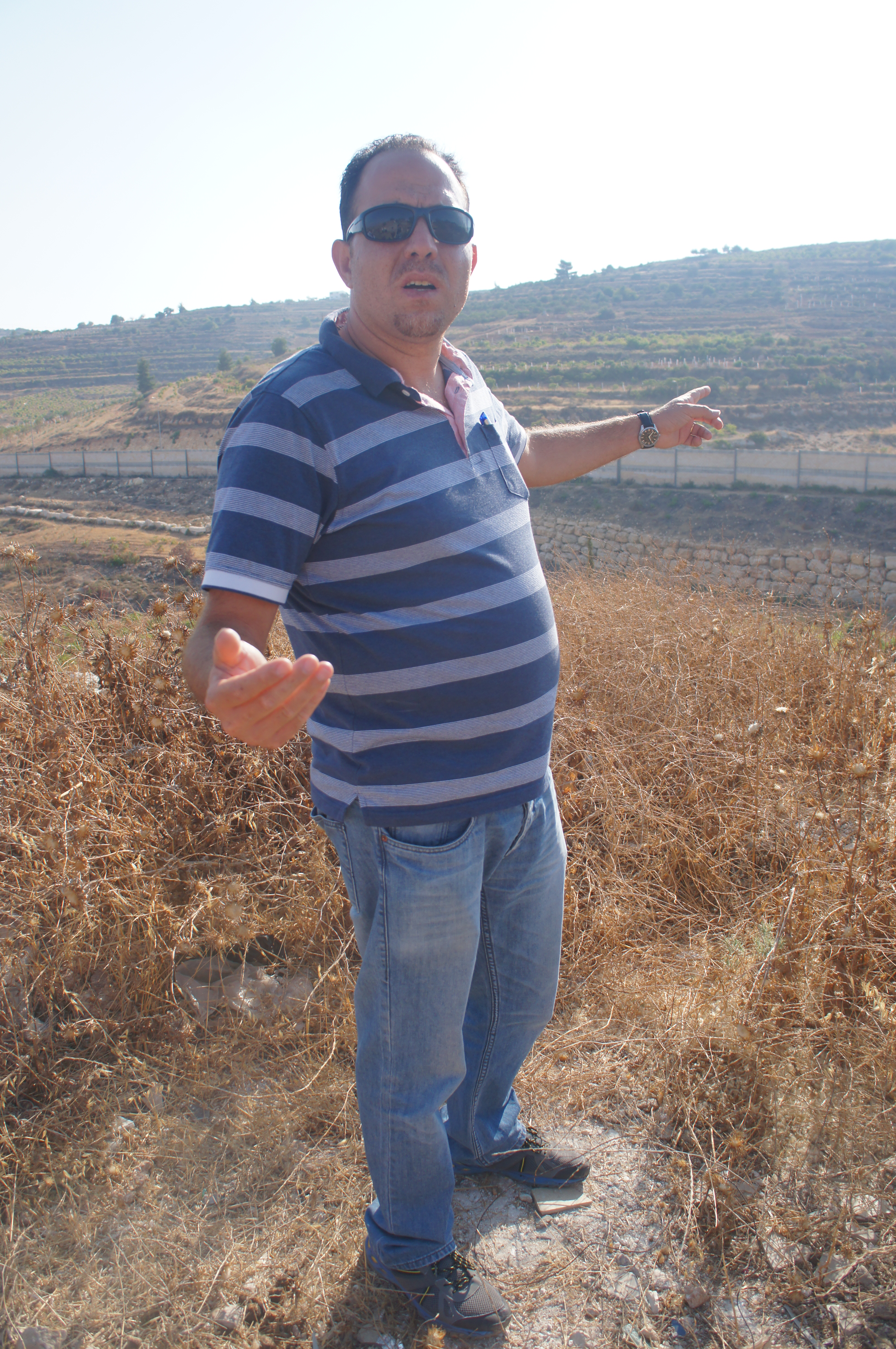
Q: How long have you been leading people on alternative tours?
A: I have been doing this for ten years. I see it as part of my nonviolent resistance. This is my duty more than my will. I have noticed that many people do not understand and do not know the truth about the Palestinian people. Israeli propaganda has suggested to people that we are terrorists and Israelis the victims. People do not understand. Just now, before this conversation I was with two Germans near the Aida refugee camp. The Israeli soldiers shot two tear gas canisters at us. I was shocked and scared. Half an hour ago my eyes were still burning.
Q: Why were the Israelis doing this?
A: This is a regular thing that the army does. They walk to the camp to show their might. This time, some children approached them and were throwing stones at them. They responded by throwing rubber bullets and tear gas. They have been doing this all week. Honesty, often I think they want us to become angry and react in a violent way. That would give them an excuse to clamp down harder on us and take more land.
Q: Describe the current situation in Palestine as you see it. What do you most want people to know?
A: First, people must understand the relationship between us and the occupying forces. I want people also to know that we are not a violent society. Through the history of the conflict, less than 1% of Palestinian society has engaged in any violent action or armed struggle. But the Israeli media has always shown us as terrorists, as has Hollywood. We are not terrorists. We are humans, and the human experience is the same everywhere. We are traumatized. If anyone loves Israel, they must help Israel to end the occupation. If more people were aware of what we are facing in our daily lives, our situation would change. If people still believe Israelis are the victims and we are the terrorists, it will not change.
Q: How do you go about your daily life in these conditions of conflict?
A: My faith keeps me going. We are tired and scared. Many of my family members and friends have migrated to other countries and encouraged us to do the same. I know it would be better for my family to go, but it would not be good for our society. Many young people are leaving, and this is a problem. It might seem good for me as an individual to go where I can have better health care and security, but it will not be good for society if all the educated people leave. Day to day, I do the best I can to support my family, and my work as a tour guide motivates me. I have passion for what I do. I want people to see and understand. My sense of duty and responsibility motivates me.
Q: What would you say to Catholics travelling to the Holy Land?
A: Right now only 40% of Catholic pilgrimages to the Holy Land come to Bethlehem. Israeli companies tell them there are no hotels in Bethlehem (even though there are actually 40). They scare them to try to keep them from coming. However, tourists have never been targeted in any violent way in Bethlehm. I want to tell Catholic pilgrims that they have brothers and sisters here; they should come and visit our parishes. We are ready to host them in our homes for a homestay or a meal. We want them to come and create friendships with us. I would urge everyone who comes to have at least one tour with a Palestinian operator. At the Wi´am Center we regularly organize educational outings, and we try to give a balanced perspective. If you are travelling to the Holy Land on a pilgrimage, trust that God will protect you.
Q: I understand everything you are saying, but many people in the US and elsewhere would argue that there is a violent element in Palestine. They would cite Hamas as a real threat, firing rockets into Israel.What would you say to them?
A: Hamas is not all the Palestinians. I am against all forms of violence, from Palestinians and from Israelis. If there was no occupation, there would not be any resistance – armed or unarmed. According to Geneva Convention 4, the Palestinians have the right to resist the occupation. Again, I am against violence, but if there were no occupation, Hamas would not be there. When Ariel Sharon withdrew from Gaza settlement in 2005, it was not the end of the occupation. More than 600 people died because of the siege. It is complicated, and there are a thousand narratives on both sides. But there is one fact. I live under an occupation that is wrong and must end. Without equal rights, without a just solution, there will not be peace. Jesus said blessed are the peacemakers, not the peace talkers.
Q: Some people on the pro-Palestinian side say that Israel should not exist at all. What do you say to them?
A: Israel has a right to exist. But this current reality of occupation is unacceptable.
Q: As you see it, how could peace be brought about? Is it possible? What would be the first step?
A: If everyone recognizes our right to be present in this land, that will be the beginning. We have been here for a long time. Honestly, some of us might have more Jewish blood than the newer immigrants who have come here. In any case, we all have a right to be here. The majority of Palestinians and Israelis I know are thirsty to live in peace, side by side. We need restorative justice with equal rights, ending the occupation and apartheid system, bringing the wall down. We need to solve the refugee crisis and end the military occupation. More and more people on both sides believe there will never be a solution, but I believe the solution will be possible. Not that long ago France and Germany were enemies, and now they are together in the EU. No one is more thirsty than us to live in peace, reconciliation and freedom.
Q: What are your thoughts on a two-state solution?
A: I am not against two state solution, but I believe it is no longer possible with our current reality.
The best solution would be one democratic state with equal rights, where a president could be Israeli and a Palestinian vice president, or vice verse, a mixed Parliament. I believe in a one state solution where everyone could have equal rights.
Q: What can those of us who live far away do to help?
Try to understand the situation, share it with others. Keep us in your prayers and thoughts. Support our organizations. Support our children in their education. Donate in any way you can, through organizations to support the education of the children, to cover their tuition. Education is another form of resistance. It helps us to support our children and build our future. Encourage people to come and visit, come and see, stay with Palestinian families, have a tour or hike, enjoy your time with us and learn more. Create a prayer group that meets and prays for peace in Jerusalem, Bethlehem, Nazareth. Invite guest speakers. The most important thing is to raise awareness. Share the stories, good news and bad news so people will understand what life is like under occupation. Communicate by Skype, build bridges. Support organizations like the Wi´am Center. Above all else, seek the truth. Don´t be pro-Palestinian. Be pro-justice.










